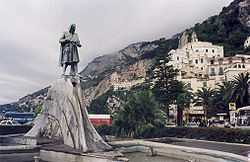Flavio Gioja

Flavio Gioja or Gioia (c. 1300) was an imaginary Italian mariner and inventor, who never, in fact, existed. He was supposedly a marine pilot and has traditionally been credited with perfecting the sailor's compass by suspending its needle over a fleur-de-lis design, which pointed north. He also enclosed the needle in a little box with a glass cover. The sailor's compass, however, had been in use long before by Mediterranean navigators.[1] (Gioia was said to have introduced the fleur-de-lis design in deference to Charles of Anjou, the French king of Naples.[2])
Flavio Gioia's birthplace is alternately given as Amalfi, Positano, Naples, or ultimately, Gioia, a town in Puglia, hence the derivation of the reputed surname. The historical misunderstanding may be the result of a simple error in syntax: the Italian historian Flavio Biondo wrote that the compass was invented by Amalfitans. This attribution was then passed on as a Flavio dicitur, i.e. "to Amalfitans, as reported by Flavio". An interposition of a comma by mistake would then read a Flavio, dicutur, changing the meaning to "to the Amalfitan, Flavio, so they say." Later, Lilio Gregorio Giraldi attributes (in his De Re Nautica from 1540) the invention of the compass to this "Flavio of Amalfi." A later historian, Scipione Mazzella, a Neapolitan, claimed (in around 1600) that Flavio was from Gioia, a town in Puglia. Thus, Flavio Gioia.
Recently, the Italian historian, Chiara Frugoni, published detailed research claiming to end all doubt: Flavio Gioia never existed. This study was cited and confirmed by the historian Alessandro Barbero in a popular Italian scientific TV program, Superquark (transmission of 7 August 2008).
The lunar crater Gioja is named after him.
Sources
- Si trattò soltanto di un errore dovuto ad una virgola (It was just a mistake caused by a comma) (found at sapere.it, stored at archive.org)